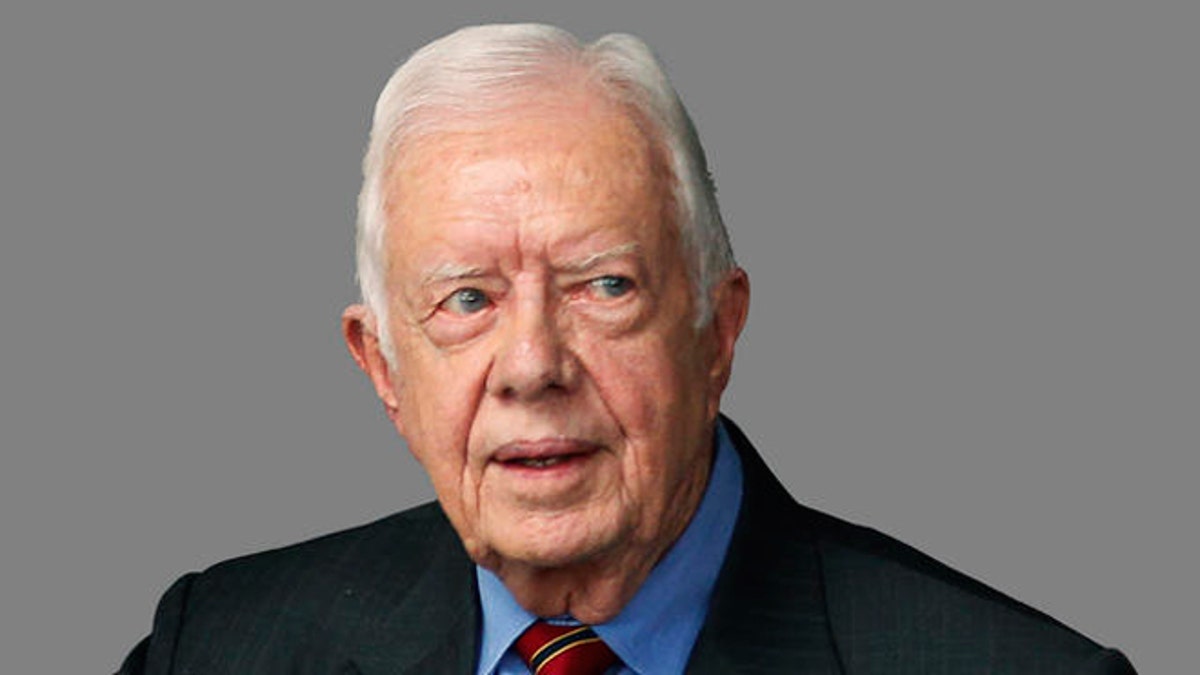
FILE: Former President Jimmy Carter (AP)
When a big historical event occurs, it’s only natural that people want to be able to say, “I was part of it,” or even, “I made it happen.” Yet such claims must be truthful, because otherwise, the opportunity to truly learn from history is lost. And so that’s why it’s important for me to set the record straight on one Gordon Stewart; for years, now, he has been claiming that he did something that he did not, in fact, do. Nor, in fact, did Stewart have anything meaningful to do with it.
To put it bluntly, Stewart is either misremembering or fantasizing about what happened. But either way, I can’t let his incorrect narrative become part of the historical record.
The big historical event in question is what happened in 1979, one of the pivotal years in US history. That year is significant because of events in the Soviet Union, China, at the Vatican and even in the United States. One of the major events from 1979 is the speech that never dies. I am referring to President Carter’s “crisis of confidence” speech, from July 15, 1979, which is often wrongly mischaracterized as his “malaise” speech – a term never used.
I will, in the future, be writing in-depth about the untold story of how that speech and the effort behind it came about. But for now, I want to correct the record about one aspect of the speech that frankly I should have done four years ago when Kevin Mattson’s "'What the Heck Are You Up To, Mr. President?': Jimmy Carter, America's 'Malaise,' and the Speech That Should Have Changed the Country" was published. It a quite positive revisionist history but, sadly, due to the fact that I never spoke to the author, it lacks the fascinating historical background that led to the speech and its aftermath.
Recently, Zev Chafets’ book, “Roger Ailes: Off Camera” which reveals the story of the man who, in my opinion, is the greatest political strategist of my lifetime, has been the subject of a lot controversy.
One of the most persistent complainers in the book is Gordon Stewart, a former member of the Carter White House speech writing staff and now a local news competitor in Putnam County, New York of Beth and Roger Ailes.
Four years ago, in both print and in interviews, Stewart claimed to be the author of the “crisis of confidence” speech. Indeed, even today, on Wikipedia, that self-sourcing reference site, the writing of the speech is attributed to him and to Rick Hertzberg, President Carter’s chief speechwriter.
The truth is, to anyone who was familiar with it, is that the idea of the speech originated from a series of long memoranda from me to President Carter and meetings in the spring of 1979 which culminated in the speech.
The initial draft of the speech, which would remain as the heart of the speech in final form, was written by myself and Wayne Grandquist of the Office of Management and Budget who assisted me. Later, my good friend, Rick Hertzberg, the chief White House speechwriter was involved with us in shaping the final text.
At the Camp David summit, which preceded the speech, it was decided to add on a last section to the speech referring to the energy crisis then facing the country. That “add on,” which was a late addition and quite secondary to the thrust of the speech, was essentially the work of Rick Hertzberg and others.
Four years ago, at the time of the Kevin Mattson book and the many articles commemorating the speech, I was puzzled by Stewart’s incredible claim but not as agitated as I should have been. I am fully willing to take the slings and arrows for that effort. Whatever anyone thinks of it, it was primarily the president’s and my initiative. And it is less pride of authorship than it is my obsession with historical accuracy which compels me to speak out now and set the record straight.
Stewart offers a cautionary tale about the truth. For anyone following his carping attacks on or about Roger Ailes they should view his complaints through the skeptical prism of knowing that on something of great and important historical record he was willing to engage in fantasy and even prevarication for the purpose of self-aggrandizement.
It is with some sadness I feel the need to make this statement. But it does remind me that there is an important and fascinating story that would complete the historical record of the “Crisis of Confidence” speech.
One silver lining to this unfortunate incident is that it is a prod to me to get about the business of fully completing the historical record that only I – and President and Rosalynn Carter -- know in full and some others in part. It is an obligation imposed for no other purpose than to serve history itself.








































